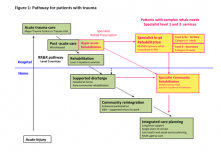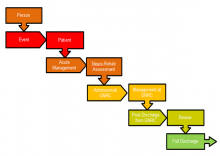Rehabilitation


Supporting Recovery
Major trauma results in complex orthopaedic and neurological injuries that may include limb loss, spinal cord injury and traumatic brain injury. In addition to the physical injuries, there is the risk of psychological trauma arising from the trauma episode and the injuries sustained. The effect of the psychological trauma can be enduring and persist for long periods after the physical injuries have healed.
Most of the clinical treatment following major trauma focuses on the acute stage with treatment directed at saving lives and preventing extension of injury damage while the patient recovers. The primary goal of rehabilitation for trauma patients is to provide them with an expedited recovery from acute injuries and progressive reintroduction back into society as functional individuals. A saved life following major trauma is more than a biological entity. Rehabilitation seeks to provide meaningful living to saved lives. Rehabilitation aims to improve participation in personal and societal level activities within limits imposed by the patient’s residual deficits and available rehabilitation facilities.
The relative youth and level of activity of major trauma victims necessitates the need for novel challenging rehabilitation methods requiring more physical and cardiac output than traditional neurorehabilitation. Many of the major trauma patients are also within working age group thereby necessitating a greater incorporation of vocational rehabilitation. The specialist rehabilitation pathway required to provide a comprehensive holistic input for victims of major trauma extends from the acute episode to long after patients have been discharged back into the community. No single service can unilaterally provide the level of input required. A variety of services varying from specialist inpatient rehabilitation teams to generic community service provision through local social services are deplored towards helping the patient achieve their rehabilitation goal. Not all patients require specialist rehabilitation and a few might be able to undergo self-guided rehabilitation programmes. It is anticipated that the rehabilitation coordinator will be able to assist in guiding each patient through the rehabilitation pathway.
Help & Support Links for Acquired Brain Injury:
Headway - The Brain Injury Assocation
Helping Improve life after brain surgery.
Help & Support Links following traumatic injury:
After Trauma
After Trauma is a website that connects and supports survivors of traumatic injury and their families. It contains information and resources to help survivors and families on their recovery journey.
The website is supported and maintained by the Centre for Trauma Sciences in London. However, the information provided is sourced from clinicians and support services working in trauma services around the UK.

